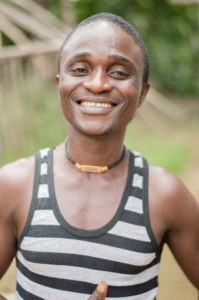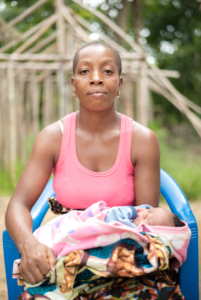Daniel Cassell works as one of Liberia’s nearly 3,400 formally employed community health workers as part of the National Community Health Assistant Program. Launched in 2016 – more than two years after the world’s deadliest Ebola outbreak began in a remote West African community not too dissimilar to Daniel’s – the program is a government-led initiative that serves those living in the country’s most remote areas.

Community Health Worker Daniel Cassell
Daniel provides essential, lifesaving care to his neighbors in a remote community in northern Rivercess County, supported by Ghanwarkpa, a clinical supervisor who visits him regularly to ensure that he has the lifesaving drugs, supplies, and mentorship needed to provide quality care. Approximately 30% of Liberia’s 4.6 million people live farther than five kilometers from a health facility, requiring them to travel long distances, often at great cost and through dense rainforest to reach traditional points of care. Access has long been a challenge, contributing to significant disparities in service delivery and health outcomes across Liberia.
Daniel is not the only healthcare professional in his household; his wife Hannah is a Trained Traditional Midwife serving the women and children of hers and other communities in the Gozohn Clinic catchment area. From her home, Hannah walks an hour to the main road where she takes a motorbike to work to assist Ghanwarkpa and other facility-based colleagues with antenatal check-ups for pregnant women. Daniel and Hannah are members of their Community Health Committee, which meets twice a month to discuss solutions to self-identified health issues affecting the community. Together, Daniel, Hannah, and Ghanwarkpa work to ensure a complete continuum of care for children and families in their quiet corner of Rivercess County. Globally, their efforts are helping to inform the integration of quality community health interventions at scale, supporting the realization of universal health coverage and the drive towards ending preventable child and maternal deaths.

Trained Traditional Midwife Hannah Cassell
A few years ago, Hannah gave birth to a healthy baby boy named Andrew. Throughout her pregnancy, Hannah used her own experience to connect with mothers in the community and to encourage them to go to at least four antenatal care visits during their gestation period. Hannah herself had nearly twice the recommended number of check-ups, partly as a way to set an example in her community, and partly to help de-stigmatize doctor visits and recast them as a responsible approach to maternal health. Thanks to her work, her community has now instituted a fund for referring pregnant women to the Gozohn clinic – removing a significant barrier to maternal health care in the community. Because of health workers like Hannah and Daniel, more pregnant women are getting the care they need. Since the national program launched in 2016, community health workers have conducted 466,737 pregnancy home visits.
Together, Hannah and Daniel are influencing the health of pregnant women and mothers in their area.




